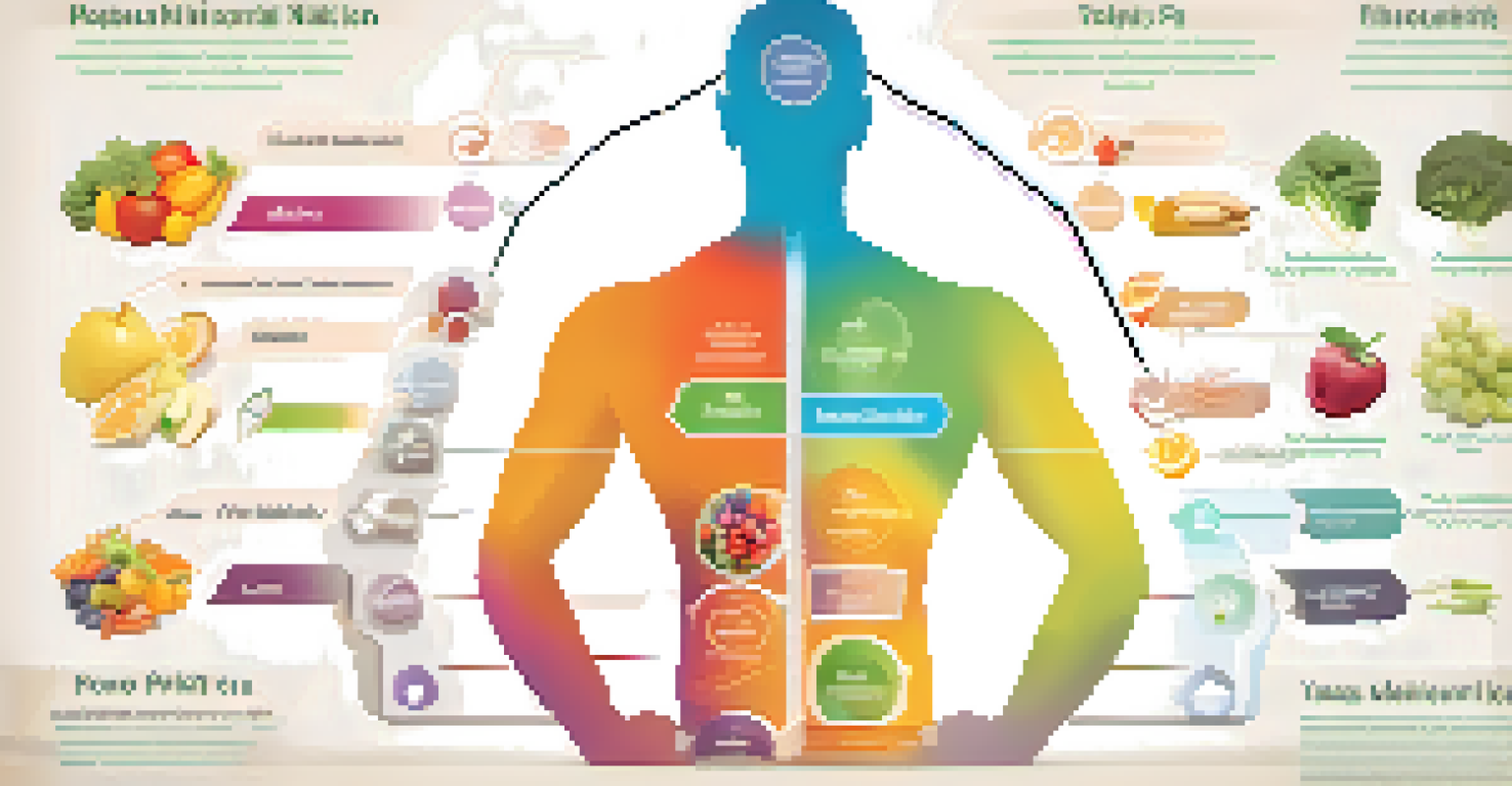The Role of Micronutrients in Personalized Nutrition Plans

What Are Micronutrients and Why They Matter
Micronutrients are essential vitamins and minerals your body needs in small amounts for optimal health. They include nutrients like iron, zinc, and vitamins A, C, and D, each playing unique roles in bodily functions. While you might not need them in large quantities, their impact on your overall health is significant, influencing everything from your immune system to energy levels.
Let food be thy medicine and medicine be thy food.
Think of micronutrients as the tiny gears in a beautifully complex machine. Without them, the machine can still function, but not at its best. This is why understanding their role is crucial when crafting personalized nutrition plans that cater specifically to your body's needs.
In a world where diets can be quite generic, focusing on micronutrients allows for a more tailored approach. By identifying individual deficiencies or requirements, you can enhance your health and well-being through a nutrition plan that fits you like a glove.
The Connection Between Micronutrients and Personalized Nutrition
Personalized nutrition is all about tailoring dietary plans to meet individual needs, and micronutrients are central to this concept. By analyzing your health history, lifestyle, and even genetic factors, nutritionists can pinpoint which micronutrients you might be lacking or need more of. This targeted approach helps in creating a more effective nutrition strategy that promotes your health goals.

For example, if a nutritionist discovers you have low levels of vitamin D—essential for bone health—they can recommend foods rich in this nutrient or suggest supplements. This ensures you are not just following a diet but are actually nourishing your body with what it specifically needs.
Importance of Micronutrients
Micronutrients are essential vitamins and minerals that play crucial roles in maintaining optimal health and well-being.
Moreover, understanding how micronutrients interact with macronutrients—like carbohydrates, proteins, and fats—can further refine your nutrition plan. It’s like fine-tuning a musical instrument; each adjustment brings you closer to harmony in your health.
Identifying Micronutrient Deficiencies
Identifying micronutrient deficiencies typically starts with a comprehensive health assessment. This may include blood tests, dietary surveys, and discussions about your lifestyle habits. By pinpointing specific deficiencies, nutritionists can provide personalized recommendations that address your unique needs.
You are what you eat, so don’t be fast, cheap, easy, or fake.
For instance, if you often feel fatigued and tests reveal low iron levels, your nutritionist might suggest incorporating more iron-rich foods like spinach or legumes into your diet. This small change can have a significant impact on your energy levels and overall well-being.
It's important to remember that deficiencies can manifest differently in each person. One person's lack of vitamin B12 might lead to fatigue, while someone else might experience mood swings. This variance is why personalized attention is vital in nutrition planning.
Integrating Micronutrients into Your Diet
Integrating micronutrients into your daily diet doesn't have to be complicated. Start by focusing on whole foods that are naturally rich in these essential nutrients. For example, leafy greens, nuts, seeds, and colorful fruits are all packed with vitamins and minerals.
A practical approach is to 'eat the rainbow.' This means including a variety of colorful fruits and vegetables in your meals, as different colors often signify different nutrients. By making your plate vibrant, you not only enhance its visual appeal but also its nutritional value.
Personalized Nutrition's Role
Tailoring dietary plans to address individual micronutrient needs enhances the effectiveness of nutrition strategies.
Additionally, consider meal prepping to ensure you're consistently including nutrient-rich foods in your diet. Planning ahead can help you avoid the temptation of convenience foods that often lack essential micronutrients.
The Role of Supplements in Micronutrient Intake
While whole foods are the best source of micronutrients, sometimes supplements can play a supportive role in your nutrition plan. If you struggle to get enough of certain vitamins and minerals through diet alone, supplements can help bridge the gap. However, it’s essential to consult with a healthcare professional before starting any supplement regimen.
For instance, individuals with limited sun exposure may benefit from vitamin D supplements, especially during winter months. Similarly, pregnant women often require additional folic acid to support fetal development, making supplements a crucial part of their nutrition plan.
That said, it’s important to remember that supplements are not a replacement for a balanced diet. They should complement your nutrition plan rather than serve as a primary source of micronutrients.
Monitoring Your Micronutrient Levels
Monitoring your micronutrient levels is a continuous process that can significantly impact your health journey. Regular check-ins with a nutritionist can help you assess whether your dietary changes are effective or if adjustments are necessary. This proactive approach ensures that you remain on track to meet your health goals.
For example, after a few months of focusing on iron-rich foods, a follow-up blood test can reveal improvements in your iron levels, confirming that your efforts are paying off. This feedback loop can be incredibly motivating and help you stay committed to your personalized plan.
Monitoring for Optimal Health
Regular assessments of micronutrient levels help ensure dietary changes are effective and aligned with health goals.
Moreover, tracking your micronutrient intake through food diaries or apps can provide valuable insights into your eating habits. It’s a simple yet effective way to ensure you’re consistently meeting your micronutrient needs.
The Future of Personalized Nutrition and Micronutrients
The future of personalized nutrition is bright, particularly with advancements in technology and research surrounding micronutrients. As more people become aware of the importance of individualized nutrition plans, we can expect a greater emphasis on tailoring diets to meet specific micronutrient needs.
Emerging technologies, such as genetic testing and microbiome analysis, could revolutionize how we understand our nutritional requirements. Imagine a world where you receive a personalized nutrition plan based on your DNA—how cool is that?

This shift towards personalization not only has the potential to improve individual health outcomes but could also lead to a more engaged public when it comes to nutrition. With the right tools and knowledge, we can all strive for better health through informed dietary choices.